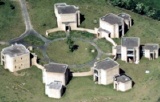2016-17 Warwick EPSRC Symposium: Numerical Analysis for PDEs
3-7 April 2017
Organisers: Andreas Dedner (Warwick), Charlie Elliott (Warwick), Charalambos Makridakis (Sussex)
Scientific summary: In many applications a major objective of deriving PDE models is to obtain quantitative information and in the majority of cases finding an exact solution is not feasible. Therefore robust numerical methods and their efficient implementation are a central requirement to render PDE models useful in these areas. In emerging applications there are new PDE models or there are new requirements on existing numerical schemes. This is resulting in both new schemes and developments in existing schemes.
In addition to the development and analysis of numerical methods this workshop will also include contributions from researchers working on implementing these methods efficiently. Major themes we plan to focus on include:
(1) Surface PDEs: In cell biology and material science a burgeoning theme of research is the coupling of surface and bulk processes giving rise to complicated systems of PDEs in complex evolving domains. Often these involve geometric PDEs. Methods here include surface finite elements and unfitted finite elements (cut cells). There are interesting connections to inverse problems, for example for discontinuous coefficients for elliptic equations.
(2) Nonstandard numerical schemes: Recently there has been a strong focus on constructing new discretizations of PDEs. For example, mimetic schemes are constructed to preserve important properties enjoyed by the continuous problem. We mention also virtual finite element methods, isogeometric methods and higher order finite volume methods. Other developments have been on a range of extensions of standard methods to very general grids required in practical engineering and scientific applications.
(3) Nonlinear and singular phenomena: A key feature of nonlinear PDEs is that they often describe singular or nearly singular phenomena appearing in several and diverse applications. An important feature of such equations is that the nonlinearity in the equations implies that solutions can be discontinuous, involve interfaces, and often weak solutions are not necessarily unique). The numerical approximation of such problems is very challenging.
(4) Numerical software: Participants will also address the need for the development of sustainable numerical software for PDEs and how novel schemes can be incorporated in an evolving modular fashion.
See also:
Mathematics Research Centre
Mathematical Interdisciplinary Research at Warwick (MIR@W)
Past Events
Past Symposia
Where possible, visitors should obtain an EDUROAM account from their own university to enable internet access whilst at Warwick.
You can register for any of the symposia or workshops online. To see which registrations are currently open and to submit a registration, please click hereLink opens in a new window.
Mathematics Research Centre
Zeeman Building
University of Warwick
Coventry CV4 7AL - UK
E-mail:
MRC@warwick.ac.uk

